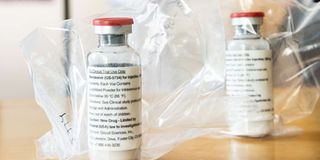Setback in war on virus as India bans export of key drug

This file photograph taken on April 8, 2020, shows vials of the drug 'remdesivir' during a press conference on Covid-19 medication at The University Hospital Eppendorf (UKE) in Hamburg, northern Germany.
What you need to know:
- Kenya could fail to meet its vaccination target of 3.2 million jabs by June.
- The county is also expecting to see its vaccine doses run out in 10 days, as the arrival of the new batch remains in limbo.
Kenya’s fight against Covid-19 has suffered another setback after India put banned export of anti-viral drug Remdesivir and its active pharmaceutical ingredients after a record surge in infections sent demand surging.
The move comes barely weeks after Delhi blocked exports of the AstraZeneca vaccine to balance surging domestic demand with international orders. The ban means poorer nations, including Kenya, will probably have to wait a few months before receiving their first shots.
Kenya could also fail to meet its vaccination target of 3.2 million jabs by June this year, as global and local supply shortage, registration confusion, and reluctance among some priority groups rock the campaign.
The county is also expecting to see its vaccine doses run out in 10 days, as the arrival of the new batch remains in limbo.
While the Pharmacy and Poisons Board (PPB) says hospitals are not permitted to use Remdesivir in the management and treatment of coronavirus patients, doctors yesterday told Nation that it is key in the fight against Covid-19, especially in adult patients with severe complications.
“PPB is lying when it says the drug is not being used. It has not been explicitly banned. People are looking for those vials and using them. It depends on an individual although science shows it does not improve the outcome of the patient,” said a doctor who sought anonymity.
Remdesivir export ban
In an interview with Nation, PPB said that the drug was not issued with an emergency use authorisation, therefore it should not be in use in Kenya.
“We are not supposed to be using it because PPB did not authorise it,” PPB deputy for directory, product evaluation and registration, Dr Peter Mbwiri Ikamati told Nation.
Dr Ikamati added that the Board is currently only approving drugs that have been greenlighted by the UN health agency.
In July 2020, Kenya was among 126 low-income and lower-middle-income countries identified by Gilead Sciences to receive generic versions of the drug.
It will be made by five companies licensed to produce it for developing country.
The Remdesivir export ban will hit Kenya hard, given that the drug is also used by Covid-19 patients on home-based care.
“The export of injection Remdesivir and Remdesivir Active Pharmaceutical Ingredients (API) is prohibited till the Covid-19 situation in the country improves,” India said in a statement.
Highest risk of exposure
Delhi is currently witnessing a resurgence of infections and, as of yesterday, there were 110,008 new active cases, which were steadily rising.
As a result, a sudden spike in demand for Remdesivir has emerged in the Asian nation, with people forming long queues for the drug.
The country is also reeling from the realisation that its ambitious effort to vaccinate 3.2million people at the highest risk of exposure by the end of June may not be possible as earlier envisaged.
As a result, the health authorities are being forced to consider extending the intervals between the two doses of Oxford/AstraZeneca’s (AZ) Covid-19 vaccine.
The supply bottleneck comes as Kenya’s vaccination roll-out accelerates to nearly 40,000 doses a day.
“We are sure it will be in May. What we are not sure about is whether it will be early, mid, or late May,” said Dr Willis Akhwale, chairperson of the Covid-19 vaccines deployment and vaccination task force.
Accessing vaccines
As it is, Kenya is currently accessing vaccines exclusively through the Covax facility whose supply has been dogged by vaccine nationalism and hoarding.
The country is among 192 others signed up to Covax which aims to supply doses for at least 20 percent of national populations. Kenya was to receive 3.6 million doses of the AZ vaccine between February and May. The first shipment of 1.2 million doses was delivered in March.
“In the next 10 days, we will be out of doses. Now, we only have about 100,000 and 245,000 doses at the central and regional stores respectively,” said Dr Akhwale.
As of April 9, over 450,000 people had been vaccinated. Of these, only 110,523 are front-line health workers. Some Kenyans have questioned the exercise, saying they received messages for a supposed next dose schedule despite not having received their first shot.
Others have had a text from the ministry on behalf of their kin. Efforts by Nation to get a response on the matter from the ministry were futile as our calls and messages to the head of the vaccination task force went unanswered.
One such recipient is Ann, a Kiambu resident who got a message from MoH informing her of her next vaccination, yet she had neither registered to be inoculated nor got a jab.
“They said they were sending the texts to next of kin though I didn’t understand why because it sounded like I was the one that had been jabbed,” was the explanation Ann received when she inquired from the MoH.
Reporting by Elizabeth Merab, Leon Lidigu, and Joseph Openda





